Please fill out the following information, and RRFC Admissions will contact you to discuss our program offerings:
Issue #65
by L. Swift and Jeff McQ
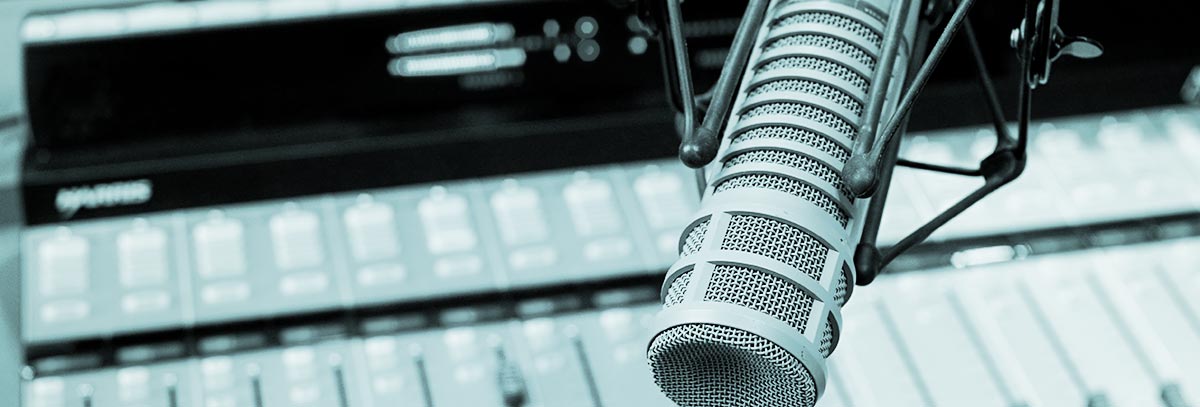

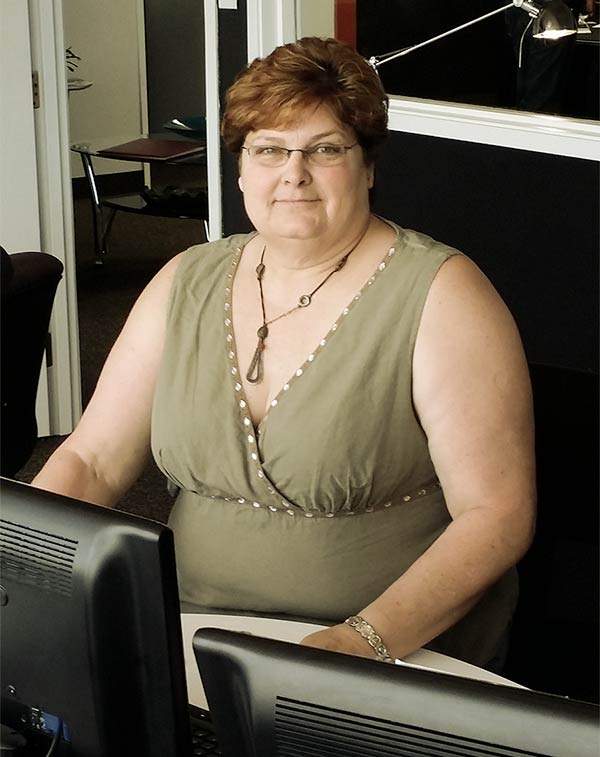 When people hear about someone trying to switch careers in their 50s, the knee-jerk reaction from some is to feel sorry, to worry that the odds may be stacked against them. But don’t tell that to Radio Connection apprentice Sherry L. Scott, who, after three decades as an auctioneer, recently decided to pursue her passion for a career in radio. She doesn’t see her age as a disadvantage at all: quite the opposite, actually.
Why? Simple: she’s had the time to figure out exactly what she wants.
“[My mentor] Percy asked me, ‘Sherry, what do you want to do?’ And I said, ‘It’s really simple. I want the 7:00 to midnight shift at the radio station so I can do all the cool stuff and meet everybody during the day, and go out and do the giveaways, and the remotes, and then go do my radio show from 7:00 to midnight every night.’ He said, ‘I can’t believe you know exactly what you want.’ I said, ‘Yeah, I do. I’m not some 18 year old kid messing around on mom and dad’s money.'”
So why a career in radio? Two words: Country music.
Well, three words, actually: TEXAS country music. And Sherry is very particular about making that distinction.
Wait…let’s back up a bit. It turns out radio itself is a huge part of Sherry’s background.
“My step-dad is a radio DJ up in Kansas,” says Sherry. “so I was kind of raised with that a little bit. And when I was in high school, we had to go out to the radio station and do the weekly bulletin. And nobody ever wanted to go and do it, so I did that. But due to my background and all that, I was in agriculture more than I was anything else. But then when I moved to Texas, the opportunity came that I could switch careers and do whatever I wanted. I’ve always loved Texas country music, and that’s what drew me to it. And I love the radio stations in Texas. They’re so abundant, and they play such good Texas music so I just kept getting drawn back to it.”
So, then, why the distinction? Why Texas country music? As Sherry points out, it’s the ongoing debate within the country genre of Texas-versus-Nashville, a debate that often finds its way into song lyrics. To Sherry, where Nashville represents the mainstream machine, Texas represents the human side of country.
“It’s so carbon copied,” she says about the Nashville sound. “You can’t do that with a Texas song. You can’t just pick six random songs by six random guys and have those melodies blend like they do in Nashville. And I think still more, the Texas music scene lives those songs…They don’t just sit in the studio and write it. And everybody that I’ve met in Texas Country, and I’ve met a lot…the cool thing about it is, I can walk up to William Clark Green, who is a top name, he’s on the charts, he’s got number ones, and he looks and he dresses exactly like me. And I know who he is and I’ve met him enough times that he recognizes me. That’s not going to happen at a Nashville concert.
“And it’s just about the music,” Sherry continues. “It’s not about the, ‘Oh, wait a minute, I’ve got to get to my next gig.’…They may show up in a great big bus, but when they’re out riding around, they’re just like me and you. It’s phenomenal. They are so personable, I love them all. There’s not a bad one in the bunch. I’ve never met a rude Texas country music artist.”
When people hear about someone trying to switch careers in their 50s, the knee-jerk reaction from some is to feel sorry, to worry that the odds may be stacked against them. But don’t tell that to Radio Connection apprentice Sherry L. Scott, who, after three decades as an auctioneer, recently decided to pursue her passion for a career in radio. She doesn’t see her age as a disadvantage at all: quite the opposite, actually.
Why? Simple: she’s had the time to figure out exactly what she wants.
“[My mentor] Percy asked me, ‘Sherry, what do you want to do?’ And I said, ‘It’s really simple. I want the 7:00 to midnight shift at the radio station so I can do all the cool stuff and meet everybody during the day, and go out and do the giveaways, and the remotes, and then go do my radio show from 7:00 to midnight every night.’ He said, ‘I can’t believe you know exactly what you want.’ I said, ‘Yeah, I do. I’m not some 18 year old kid messing around on mom and dad’s money.'”
So why a career in radio? Two words: Country music.
Well, three words, actually: TEXAS country music. And Sherry is very particular about making that distinction.
Wait…let’s back up a bit. It turns out radio itself is a huge part of Sherry’s background.
“My step-dad is a radio DJ up in Kansas,” says Sherry. “so I was kind of raised with that a little bit. And when I was in high school, we had to go out to the radio station and do the weekly bulletin. And nobody ever wanted to go and do it, so I did that. But due to my background and all that, I was in agriculture more than I was anything else. But then when I moved to Texas, the opportunity came that I could switch careers and do whatever I wanted. I’ve always loved Texas country music, and that’s what drew me to it. And I love the radio stations in Texas. They’re so abundant, and they play such good Texas music so I just kept getting drawn back to it.”
So, then, why the distinction? Why Texas country music? As Sherry points out, it’s the ongoing debate within the country genre of Texas-versus-Nashville, a debate that often finds its way into song lyrics. To Sherry, where Nashville represents the mainstream machine, Texas represents the human side of country.
“It’s so carbon copied,” she says about the Nashville sound. “You can’t do that with a Texas song. You can’t just pick six random songs by six random guys and have those melodies blend like they do in Nashville. And I think still more, the Texas music scene lives those songs…They don’t just sit in the studio and write it. And everybody that I’ve met in Texas Country, and I’ve met a lot…the cool thing about it is, I can walk up to William Clark Green, who is a top name, he’s on the charts, he’s got number ones, and he looks and he dresses exactly like me. And I know who he is and I’ve met him enough times that he recognizes me. That’s not going to happen at a Nashville concert.
“And it’s just about the music,” Sherry continues. “It’s not about the, ‘Oh, wait a minute, I’ve got to get to my next gig.’…They may show up in a great big bus, but when they’re out riding around, they’re just like me and you. It’s phenomenal. They are so personable, I love them all. There’s not a bad one in the bunch. I’ve never met a rude Texas country music artist.”
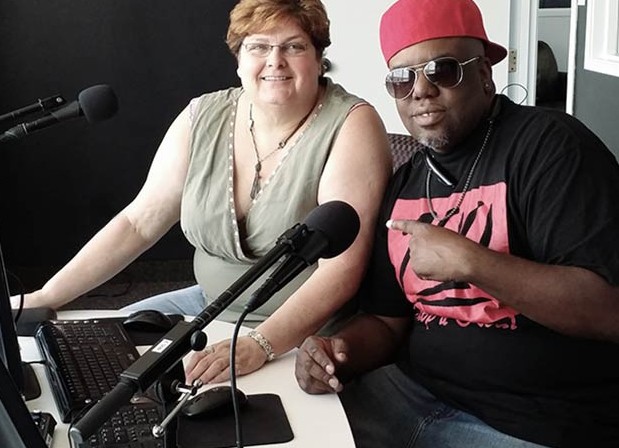 Passionate, indeed.
That passion is already serving Sherry well as she works through her apprenticeship with her mentor, Percy Holland of Fishbowl Radio in Dallas, TX. While Percy’s genre in radio is a bit different—he hosts a Christian hip-hop show—Sherry says she’s learning a lot, and she’s making the most of the opportunity.
“I’ll tell you what: Percy Holland is amazing,” she says. “His range… [and what] he has helped me with so far. We’re working on me as a product, selling me as a product, and getting my label up, so to speak. We’re working on Adobe Audition, learning how to mix, and stuff like that. This man is amazing…He’s been doing this since he was like 16.”
As it turns out, Sherry’s existing connections within Texas country are already helping her, and she’s even found common ground with her mentor, who one day asked if she knew Jimmy Jones. “I said, “Yeah, he’s on my Twitter feed and he’s on my Facebook!’ And he goes, ‘Really?’ [He’s a] Texas country artist. [He] can play and sing like there’s no tomorrow. He’s going to be on our show this Saturday night.”
Our show? Yep—Sherry’s already getting air-time with her mentor. In fact, “We had three weeks where it was just Percy and I on the radio, carrying the show for two hours,” she says.
Of course, there are obstacles to overcome. For Sherry, her 35 years as an auctioneer have been both an advantage and a hindrance. While she is certainly no stranger to talking in public, she’s used to a much faster speaking tempo, and she’s faced with learning how to adapt.
“I’ve got to get out of the auctioneer voice because I tend to talk really fast a lot,” she says. “So we’re working on that where I slow down my pace a little bit for just regular radio. Now commercials are different because you’re sometimes on a 30-second, or 15-second, or whatever, where you’ve got to do a quick interval or something like that. But as for just back and forth between, I’ve been really working on my tempo on that.”
For a go-getter like Sherry, the on-the-job training approach of the Radio Connection couldn’t be a better fit. “I am a hands-on person, and I’m a visual person,” she says. “I am a non-traditional person in every sense of the word. So this schooling is perfect for me. This is absolutely awesome…I called Alex up Monday, who is my student advisor, and my face hurt from smiling so much. That’s how much fun this is.”
As for her dream, and where she sees herself going with this new career—once again, Sherry knows exactly where she wants to be: in the very heart of Texas country. “I want to end up down around Austin, down around the hill country, down around Gruene Hall,” she says. “I want to be down in that area and playing Texas music. I love it.”
Passionate, indeed.
That passion is already serving Sherry well as she works through her apprenticeship with her mentor, Percy Holland of Fishbowl Radio in Dallas, TX. While Percy’s genre in radio is a bit different—he hosts a Christian hip-hop show—Sherry says she’s learning a lot, and she’s making the most of the opportunity.
“I’ll tell you what: Percy Holland is amazing,” she says. “His range… [and what] he has helped me with so far. We’re working on me as a product, selling me as a product, and getting my label up, so to speak. We’re working on Adobe Audition, learning how to mix, and stuff like that. This man is amazing…He’s been doing this since he was like 16.”
As it turns out, Sherry’s existing connections within Texas country are already helping her, and she’s even found common ground with her mentor, who one day asked if she knew Jimmy Jones. “I said, “Yeah, he’s on my Twitter feed and he’s on my Facebook!’ And he goes, ‘Really?’ [He’s a] Texas country artist. [He] can play and sing like there’s no tomorrow. He’s going to be on our show this Saturday night.”
Our show? Yep—Sherry’s already getting air-time with her mentor. In fact, “We had three weeks where it was just Percy and I on the radio, carrying the show for two hours,” she says.
Of course, there are obstacles to overcome. For Sherry, her 35 years as an auctioneer have been both an advantage and a hindrance. While she is certainly no stranger to talking in public, she’s used to a much faster speaking tempo, and she’s faced with learning how to adapt.
“I’ve got to get out of the auctioneer voice because I tend to talk really fast a lot,” she says. “So we’re working on that where I slow down my pace a little bit for just regular radio. Now commercials are different because you’re sometimes on a 30-second, or 15-second, or whatever, where you’ve got to do a quick interval or something like that. But as for just back and forth between, I’ve been really working on my tempo on that.”
For a go-getter like Sherry, the on-the-job training approach of the Radio Connection couldn’t be a better fit. “I am a hands-on person, and I’m a visual person,” she says. “I am a non-traditional person in every sense of the word. So this schooling is perfect for me. This is absolutely awesome…I called Alex up Monday, who is my student advisor, and my face hurt from smiling so much. That’s how much fun this is.”
As for her dream, and where she sees herself going with this new career—once again, Sherry knows exactly where she wants to be: in the very heart of Texas country. “I want to end up down around Austin, down around the hill country, down around Gruene Hall,” she says. “I want to be down in that area and playing Texas music. I love it.”
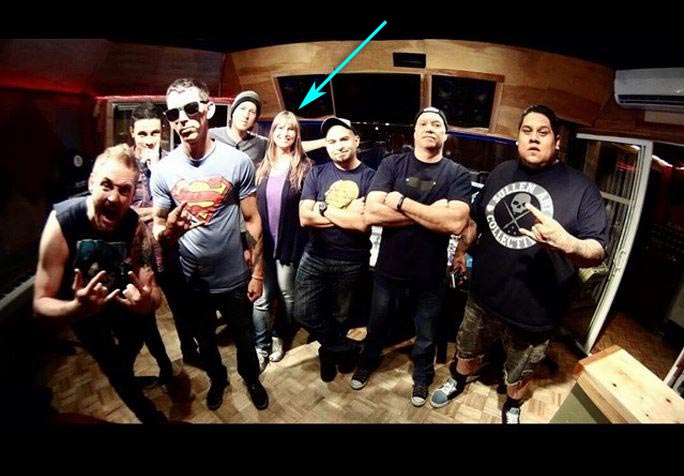 Recording Connection apprentice Dawnette Scolari at ES Audio in Glendale, CA, had a blast rockin’ out with 7 Days Away who’s recording their new EP on the Vinyl Soul label! You go girl! (photo credit d_sco18 on Instagram)
Recording Connection apprentice Dawnette Scolari at ES Audio in Glendale, CA, had a blast rockin’ out with 7 Days Away who’s recording their new EP on the Vinyl Soul label! You go girl! (photo credit d_sco18 on Instagram)
 While running camera for a political video about healthcare, Film Connnection apprentice Jeremiah Allen of Eaton Rapids, MI experienced the distinct satisfaction that comes from figuring out what’s wrong on a shoot and knowing how to correct it (someone else had messed up, but we’re not naming names). All in a day’s work for a rising pro!
While running camera for a political video about healthcare, Film Connnection apprentice Jeremiah Allen of Eaton Rapids, MI experienced the distinct satisfaction that comes from figuring out what’s wrong on a shoot and knowing how to correct it (someone else had messed up, but we’re not naming names). All in a day’s work for a rising pro!
 Just as Recording Connection apprentice Kate Richardson (Jacksonville, FL) began learning how to record vocals, Chef Robert Irvine from Restaurant Impossible also came in to her mentor’s studio to do some voiceover work! “I could immediately recognize the accent,” she says. Seeing how the pros do voiceover was informative, with each line repeated twice, then off from there to mix and edit.
Just as Recording Connection apprentice Kate Richardson (Jacksonville, FL) began learning how to record vocals, Chef Robert Irvine from Restaurant Impossible also came in to her mentor’s studio to do some voiceover work! “I could immediately recognize the accent,” she says. Seeing how the pros do voiceover was informative, with each line repeated twice, then off from there to mix and edit.
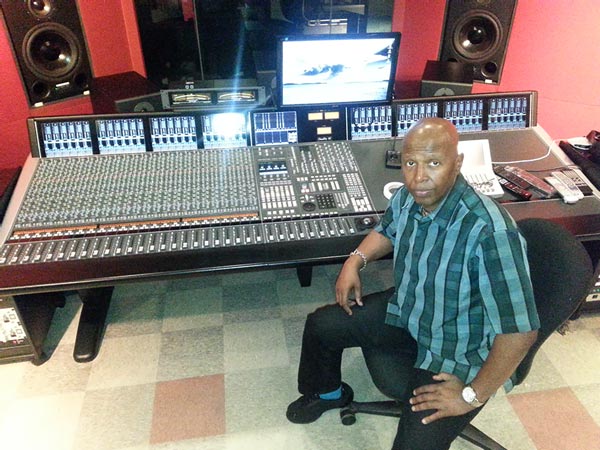 There aren’t many people who truly fit the description of “music industry veteran” like Recording Connection mentor Romeo Williams. Starting off in the industry as a professional bass player, then moving into songwriting, engineering and production, he’s been credited on many Gold and Platinum records, worked with amazing artists like Alicia Keys, Luther Vandross, Brian Eno and others, and even toured with Elton John as part of his band for more than three years. Today, he remains a first-call rock and R&B session player while producing and engineering in recording studios on both coasts.
In a recent conversation with RRFC, Romeo shared a lot of interesting tidbits with us about his long career in music, talked about secrets he shares with his students, and even ventured into knocking down gender stereotypes when it comes to production work in the studio. Here are a few insights we took away from the conversation.
There aren’t many people who truly fit the description of “music industry veteran” like Recording Connection mentor Romeo Williams. Starting off in the industry as a professional bass player, then moving into songwriting, engineering and production, he’s been credited on many Gold and Platinum records, worked with amazing artists like Alicia Keys, Luther Vandross, Brian Eno and others, and even toured with Elton John as part of his band for more than three years. Today, he remains a first-call rock and R&B session player while producing and engineering in recording studios on both coasts.
In a recent conversation with RRFC, Romeo shared a lot of interesting tidbits with us about his long career in music, talked about secrets he shares with his students, and even ventured into knocking down gender stereotypes when it comes to production work in the studio. Here are a few insights we took away from the conversation.
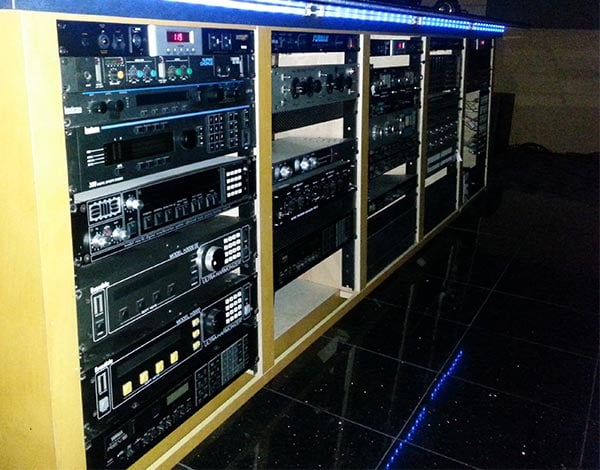 ON HOW HE GOT INTO THE PRODUCING/ENGINEERING SIDE OF THE STUDIO: “Usually when you’re in a band, one of you guys is the person who works the PA system while you’re on stage. That was me. What really got me interested doing that stuff after doing these sessions and writing songs and [being] the person trying to explain everything, we were just tired of paying for studio time in places…When I was working with [producers like] John Barnes and stuff and Bruce Wheaton, I would ask questions at every session like, ‘What’s this?’ and ‘Oh, really?’ and listen and just pay attention to sounds. When we had a minute to talk about audio and what to do…I asked the questions and then I just studied it. I spent time watching them and listening.”
ON THE ‘OLD-SCHOOL’ APPROACH TO ENGINEERING COMPARED TO TODAY: “Back in the day when I came up engineering, you really had to be an engineer. It was only 22 tracks and you had to make a decision. You had to think about everything. You couldn’t just, ‘Oh, let’s do this on the fly.’ You had to really plan everything out; you had to line the tape machine up. That took about an hour and half just on that alone… Back in the day, you had to anticipate, and if you messed up, there was no undo. There was no such thing as a preset…I’m from the old school; I call them the microwave age. Everything is done fast, they have too many choices, 250,000 plug-ins, and they want to use them all.”
ON THE CURRENT TREND IN RECORDING TO GET BACK TO AN ANALOG SOUND: “Everybody just really wants to go back to having that analog saturated tape sound. That’s what a lot of guys are doing, Puffy, Jay Z and Timbaland. A lot of these guys are taking the Pro Tools stuff, sending it to the analog, and it’s an analog [console] making the mixes and stuff.”
ON HIS APPROACH TO MIXING: “Everybody is quick to grab EQ and compressors and all that kind of stuff. I go, ‘Well, listen. If it’s not broke, you don’t fix it.’ That’s basically what mixing is about…I’m already mixing as I’m recording. The people that trained me, my mentors, they weren’t really crazy about compressors. They figured if you had to use a compressor there had to be a need to be able to use it when you have someone just out of control.”
ON HEADROOM: “Nowadays they don’t understand about headroom but I do because we had to worry about and think about headroom. I look at their mixes and I go, ‘Okay, mine sounds like it’s already mastered,’ and I didn’t do anything to it.”
ON BREAKING GENDER STEREOTYPES IN THE ENGINEERING WORLD: “It’s getting to the point that 95% of the top studio managers, at least in LA, that I know in Hollywood, are female. I’m telling any young lady that is gonna be an engineer, ‘You have a better shot at getting a job than a man will’…Most female engineers that I’ve trained were better than the males because they paid attention to detail.”
ON WHAT HE WANTS TO SEE IN HIS STUDENTS: “They have to love this. You have to eat and breathe this. I want them to eat and breathe this so when they go into a situation when they finish with me, they have confidence. They can walk into a place and say, ‘Okay, what would you like me to do?’ and do it, No questions asked. Then there’s no fear.”
ON HOW HE GOT INTO THE PRODUCING/ENGINEERING SIDE OF THE STUDIO: “Usually when you’re in a band, one of you guys is the person who works the PA system while you’re on stage. That was me. What really got me interested doing that stuff after doing these sessions and writing songs and [being] the person trying to explain everything, we were just tired of paying for studio time in places…When I was working with [producers like] John Barnes and stuff and Bruce Wheaton, I would ask questions at every session like, ‘What’s this?’ and ‘Oh, really?’ and listen and just pay attention to sounds. When we had a minute to talk about audio and what to do…I asked the questions and then I just studied it. I spent time watching them and listening.”
ON THE ‘OLD-SCHOOL’ APPROACH TO ENGINEERING COMPARED TO TODAY: “Back in the day when I came up engineering, you really had to be an engineer. It was only 22 tracks and you had to make a decision. You had to think about everything. You couldn’t just, ‘Oh, let’s do this on the fly.’ You had to really plan everything out; you had to line the tape machine up. That took about an hour and half just on that alone… Back in the day, you had to anticipate, and if you messed up, there was no undo. There was no such thing as a preset…I’m from the old school; I call them the microwave age. Everything is done fast, they have too many choices, 250,000 plug-ins, and they want to use them all.”
ON THE CURRENT TREND IN RECORDING TO GET BACK TO AN ANALOG SOUND: “Everybody just really wants to go back to having that analog saturated tape sound. That’s what a lot of guys are doing, Puffy, Jay Z and Timbaland. A lot of these guys are taking the Pro Tools stuff, sending it to the analog, and it’s an analog [console] making the mixes and stuff.”
ON HIS APPROACH TO MIXING: “Everybody is quick to grab EQ and compressors and all that kind of stuff. I go, ‘Well, listen. If it’s not broke, you don’t fix it.’ That’s basically what mixing is about…I’m already mixing as I’m recording. The people that trained me, my mentors, they weren’t really crazy about compressors. They figured if you had to use a compressor there had to be a need to be able to use it when you have someone just out of control.”
ON HEADROOM: “Nowadays they don’t understand about headroom but I do because we had to worry about and think about headroom. I look at their mixes and I go, ‘Okay, mine sounds like it’s already mastered,’ and I didn’t do anything to it.”
ON BREAKING GENDER STEREOTYPES IN THE ENGINEERING WORLD: “It’s getting to the point that 95% of the top studio managers, at least in LA, that I know in Hollywood, are female. I’m telling any young lady that is gonna be an engineer, ‘You have a better shot at getting a job than a man will’…Most female engineers that I’ve trained were better than the males because they paid attention to detail.”
ON WHAT HE WANTS TO SEE IN HIS STUDENTS: “They have to love this. You have to eat and breathe this. I want them to eat and breathe this so when they go into a situation when they finish with me, they have confidence. They can walk into a place and say, ‘Okay, what would you like me to do?’ and do it, No questions asked. Then there’s no fear.”
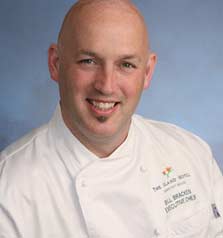 “Traditional culinary education to me is the apprenticeship mentorship approach. This is the way our culinary industry started out. I believe the mentorship approach to culinary education is a sound one. The profit loss statement of every culinary operation looks to productivity and efficiency as its number one priority. Having to re-teach culinary graduates is not only inefficient but also costly and time-consuming”
— Bill Bracken, Owner of “Bracken’s Kitchen” Food and Beverage Consulting, Los Angeles, CA
“Traditional culinary education to me is the apprenticeship mentorship approach. This is the way our culinary industry started out. I believe the mentorship approach to culinary education is a sound one. The profit loss statement of every culinary operation looks to productivity and efficiency as its number one priority. Having to re-teach culinary graduates is not only inefficient but also costly and time-consuming”
— Bill Bracken, Owner of “Bracken’s Kitchen” Food and Beverage Consulting, Los Angeles, CA
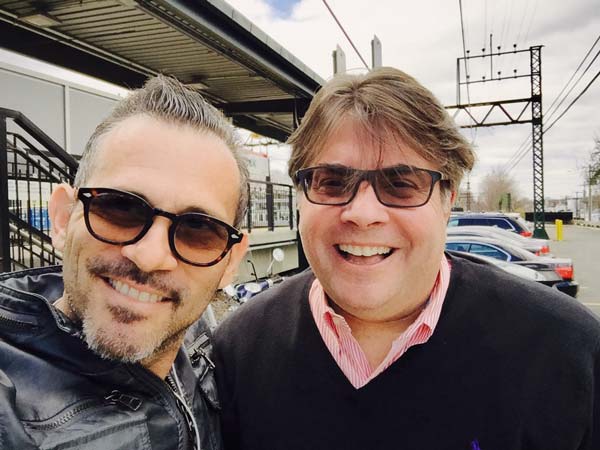 Recently, Recording Connection’s Brian Kraft took a bite out of the Big Apple to meet with the industry’s hitmakers and influencers. After flying into NYC, Brian caught a train to Mamaroneck to meet with powerhouse manager Joe D’Ambrosio. Joe D’Ambrosio Management, Inc. (JDMI) is a full-service music management company representing producers, engineers, mixers, arrangers, writers, remixers, sound designers and composers to music, television, film, advertising, game and online entertainment companies. Some of JDMI’s clients include Tony Visconti, Elliot Scheiner, Frank Filipetti, Hugh Padgham and more; check out jdmanagement.com for a full list.
Over coffee at a cafe near the train station, Brian and Joe bonded over stories, mutual friends and industry connections, realizing they had lots in common, family from the same neighborhood, love for great Italian food and belief in RRFC’s Mentorship program and mission.
Brian notes, “‘Love’ is not strong enough of a word to describe how I feel about Joe D’Ambrosio. Great meeting – like having coffee with a long-lost brother. We have lots in common. He grew up in the Bronx, which is where my mom is from.”
Joe was very enthusiastic about the mentorship system and told Brian, “Whatever you need, simply let me know.”
More to come from Joe and RRFC!
Recently, Recording Connection’s Brian Kraft took a bite out of the Big Apple to meet with the industry’s hitmakers and influencers. After flying into NYC, Brian caught a train to Mamaroneck to meet with powerhouse manager Joe D’Ambrosio. Joe D’Ambrosio Management, Inc. (JDMI) is a full-service music management company representing producers, engineers, mixers, arrangers, writers, remixers, sound designers and composers to music, television, film, advertising, game and online entertainment companies. Some of JDMI’s clients include Tony Visconti, Elliot Scheiner, Frank Filipetti, Hugh Padgham and more; check out jdmanagement.com for a full list.
Over coffee at a cafe near the train station, Brian and Joe bonded over stories, mutual friends and industry connections, realizing they had lots in common, family from the same neighborhood, love for great Italian food and belief in RRFC’s Mentorship program and mission.
Brian notes, “‘Love’ is not strong enough of a word to describe how I feel about Joe D’Ambrosio. Great meeting – like having coffee with a long-lost brother. We have lots in common. He grew up in the Bronx, which is where my mom is from.”
Joe was very enthusiastic about the mentorship system and told Brian, “Whatever you need, simply let me know.”
More to come from Joe and RRFC!
 We’re happy to announce we’re showing our support for a terrific cause—the 18th Annual AudioMasters Benefit Golf Tournament at Harpeth Hills Golf Course in Nashville, TN on May 14th and 15th. The two day golfing event benefits the Nashville Engineer Relief Fund, established by the Nashville AES (Audio Engineering Society), to provide financial assistance to Nashville’s engineers in the event of a medical or life crisis.
RRFC will be sponsoring “hole #8” on May 14th and RRFC Consultant Brian Kraft will be there to represent! We’re truly honored and privileged to be able to show our support for this very worthy cause!
We’re happy to announce we’re showing our support for a terrific cause—the 18th Annual AudioMasters Benefit Golf Tournament at Harpeth Hills Golf Course in Nashville, TN on May 14th and 15th. The two day golfing event benefits the Nashville Engineer Relief Fund, established by the Nashville AES (Audio Engineering Society), to provide financial assistance to Nashville’s engineers in the event of a medical or life crisis.
RRFC will be sponsoring “hole #8” on May 14th and RRFC Consultant Brian Kraft will be there to represent! We’re truly honored and privileged to be able to show our support for this very worthy cause!

RRFC is education upgraded for the 21st century.
Get the latest career advice, insider production tips, and more!
Please fill out the following information, and RRFC Admissions will contact you to discuss our program offerings:
Stay in the Loop: Subscribe for RRFC news & updates!
© 2025 Recording Radio Film Connection & CASA Schools. All Rights Reserved.



